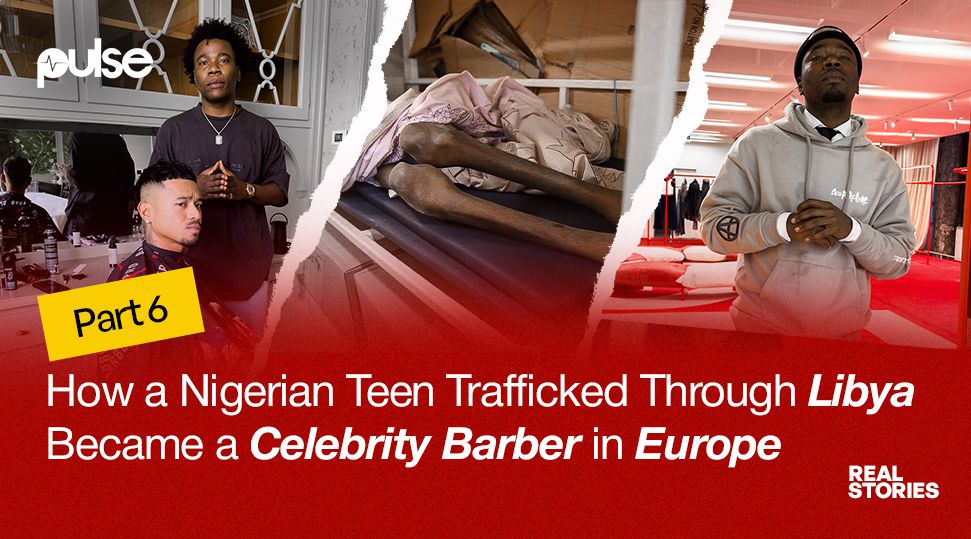Part 5 recap: In Libya, Jimmy’s nightmare deepened. Betrayed by a fellow Nigerian and forced into another prison, he became a barber, cutting hair with blades and combs for both captors and captives. It wasn’t freedom, but it was survival. Just when it seemed the routine of suffering would never end, a new terror approached.
Catch up here: Part 5: How a Nigerian teen trafficked through Libya became a celebrity barber in Europe
The Escape
Just when Jimmy thought the worst might be over, or maybe that it would never end at all, war broke out in the camps.
Rebel fighters stormed the area. Guns. Bombs. Grenades. They came to raid and take over.
Jimmy remembered the sound of bullets ripping through corrugated metal. Fences torn apart like paper. The thick, choking smoke from grenades thrown carelessly into buildings where men like him were still locked up.
In that chaos, something shifted.
Everyone ran. Screaming. Scrambling. Some barefoot, some bloodied, some already halfway dead. Prisoners scattered in all directions—no plan, no guide, just instinct. Jimmy ran too. He lost one of his closest friends that day. A brother-in-struggle who had been with him since the journey began. One minute he was there, the next, gone, swallowed by the smoke, the gunfire, and the madness.
But somehow, Jimmy made it out.
He and a few others sprinted through the narrow alleys of the city, through winding streets and broken compounds. They ran past abandoned cars, charred doors, bodies they didn’t dare look back at. They didn’t stop until the gunfire was far behind them.
Eventually, they found themselves in another part of Tripoli. There, they found others like them; Ghanaians, Nigerians, Somalis. All camped near the shore, waiting for something, anything, that could take them across the sea.
Jimmy was seventeen. No money. No food. No passport. Just scars and a small comb with a rusty razor blade. But he had survived this far. And that was something.
So he got to work.
He washed cars, hauled luggage, carried water, and cleaned compounds. Anything anyone would pay a few coins for. And through it all, he kept cutting hair right there on the street, by the roadside, behind parked trucks, in corners where the wind couldn’t blow the hair too far away.
He saved every coin.
It wasn’t much. But for a month or two, they scraped together what little they could. He and a few others took it to the smugglers—the faceless men who ran the boats across the Mediterranean.
“This is all we have,” they said. “Please, help us get to Italy.”
The smugglers didn’t say much. Just nodded. And that was it.
For two weeks, they slept by the shoreline, surrounded by the same silence that had haunted them in the desert, except this time, it was the sea whispering. They watched people leave before them. Some never came back. Some boats capsized. Others drifted off and were never heard from again.
The Dangerous Crossing
When their turn finally came, there was no announcement, no preparation, and no second thoughts. Just one of the men walking up to Jimmy and the others by the seashore, muttering two words:
“Let’s go.”
They were all loaded onto one of those black rubber dinghies, packed shoulder to shoulder. Over a hundred people crammed. Bodies pressed together, sweat mixing with salt air, hearts pounding.
It was never meant to hold half that number. But no one questioned it. They pushed off. And just like that, the land disappeared behind them, swallowed by the dark.
There were no lights. Only the groaning of rubber under pressure, the nervous shuffling of limbs, and the sea slapping against the sides of the boat like a warning.
At first, there was silence.
Some people whispered prayers. Others cried quietly. The rest stared blankly into the blackness. A few held hands. Most held their breath.
Jimmy sat in the middle, eyes on the horizon, body frozen.
They drifted for hours.
The boat heaved with each wave, rising and falling like a chest struggling to breathe. With every bounce, water splashed in. First, just a few drops. Then puddles. Then panic.
The water began pooling at their feet, and it kept rising. When people noticed it was getting serious, panic set in. Everyone started rushing to one side of the boat, trying to avoid the part where the water was coming in.
That weight shift capsized the boat.
Just like that, they were in the water. Screaming, splashing, drowning.
Would they make it out of this watery hell?
Find out in Part 7 of Jimmy’s story next Friday, only on Pulse.ng.
YOU MIGHT LIKE: The Silence Around Male Abuse: Why Do We Ignore Men and Boys Who Are Victims?
>
